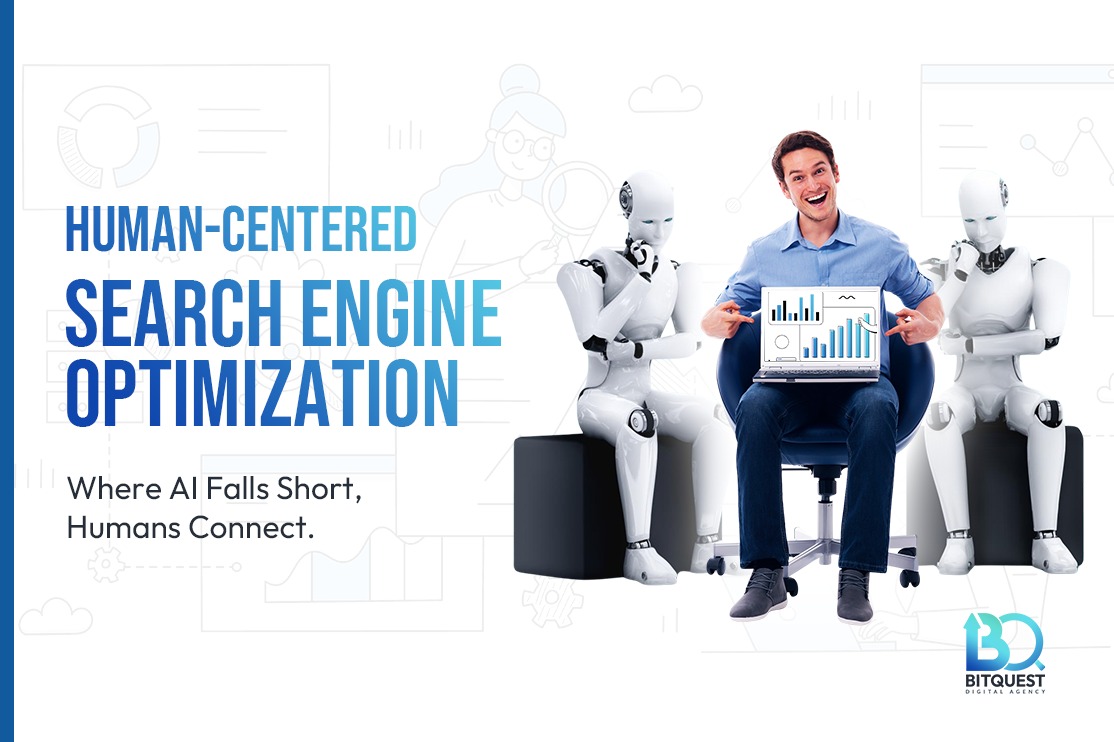Human Centred SEO How to Succeed Where AI Tactics Struggle

Artificial intelligence has infiltrated nearly every aspect of our lives, including search engines and content generation tools. AI is completely changing the digital marketing space. For example, it is changing the way we search, the way websites are ranked and the way users consume the content. However, during this technological revolution, something is often overlooked: people.
As most companies continue to invest more in AI-created content, more intelligent algorithms, and keyword automation, another strategy is beginning to emerge: human-centred SEO. It is not a matter of disregarding technology. It is about making it serve the actual human needs in a better way.
The Issue of AI-Only SEO
In a few seconds, AI tools can write thousands of words. However, quantity does not mean quality. Much of the AI-generated content lacks one important thing: human connection. It can be polished, but usually it lacks emotional depth, narration and applicability to the real world.
That poses a significant issue: the users scroll through the pages of the content and feel... nothing. No trust. No engagement. No cause to remain.
The current viewers demand more. They desire to hear the answers that make sense to them, content that knows their situation and brands that speak their language. It is here where human-centred SEO comes
What is Human-Centred SEO?
It is a user-centric strategy that focuses on the experience, intent and needs of the user. Rather than mere ranking, it poses:
What do the audience need to know?
What is their search and speech?
How do they want to be addressed?
It implies creating something that seems personal, helpful, and familiar, rather than technically accurate. This method is particularly useful when it comes to such industries as digital marketing services, where it is not necessary to get clicks but to establish long-lasting relationships.
Search is More Conversational These Days
As AI-assisted search, voice assistants, and such tools as the Search Generative Experience (SGE) developed by Google become increasingly popular, the interaction between search engines and their users is evolving.
The users are no longer entering single keywords. They are putting the entire question, such as:
What are the best social media marketing agencies to select?
What is the type of SEO strategy that is effective for small businesses in Malaysia?
This is why the content must be organised in a way that answers natural questions and is presented clearly and conversationally. Human-centred SEO involves adding FAQs, headings that resemble actual questions, and making complex concepts simple.
Trust is Better than Algorithm Tricks
Trust and experience are now included in ranking content using search engines. This implies that it is no longer possible to copy, keyword stuff, or write thin articles.
The content that provides new insights, personal experiences, and actual knowledge will work better. It not only ranks, but also makes a real impact.
This is increasingly important to companies that provide digital marketing services or are social media marketing agency. People would like to do business with those who know their needs, not those who are at the top of Google.
Local SEO in Malaysia Needs a Human Focus
As a company that is operating in Malaysia, human-centred SEO is even more important. The online environment is multicultural, multilingual and dynamic. People relate more to the content that appeals to the local culture, language and values.
This is why the one-size-fits-all is never effective. An effective SEO agency in Malaysia understands how to personalise the content, whether in a Facebook post, a YouTube advertisement, or a service page, to make it seem personal.
Conclusion
Artificial intelligence will be able to scale content, accelerate research, and enhance technical SEO. It cannot substitute the human factor, though. When everything is being cranked out by computers, genuineness and compassion are becoming actual points of distinction.
In order to thrive in the new search environment, SEO should not be about keywords and rankings. They need to relate to real people in real ways.
What BitQuest Is Doing Differently
At BitQuest, we use new AI tools to help drive human creativity and strategic thinking. Our SEO experts aren't just focused on what's best for an algorithm; they're building experiences for real people. Every blog, campaign, and landing page we create is driven by human perception, supported by smart automation. We believe in human-first SEO and support with smart tech, not the other way around. When people feel recognised, heard, and understood, they engage, convert, and return.
Frequently Asked Questions
What are the roles of humans and AI in SEO?
Humans contribute emotional intelligence, vision, and storytelling. AI contributes data analysis, automation, and media scaling. When combined effectively, humans and AI create efficient, compelling SEO strategies.
How to make AI more human?
Start with human-generated input: the questions users ask, tone of voice guidelines, and audience personas. Let AI help support the content development process, not replace it. Human hands should always review, edit, and humanise the content developed by AI before publication.
What are the challenges of AI in SEO?
AI can produce generic or incorrect information, overlook cultural context, and have an over-prioritization on keywords. AI can create content that ranks, but without the human process to oversee it, it could produce content that is bland or undesirable for users.
